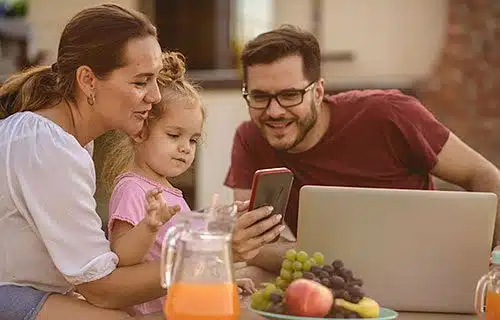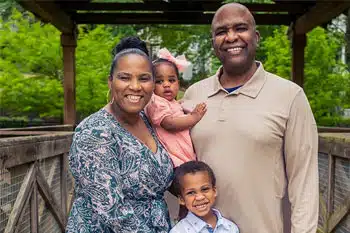Modern open adoption has many benefits for everyone in the adoption triad. For example, prior to the adoption, adoptive and birth parents can work together to decide how much contact they will have in the future after the adoption is complete.
Adoptive families sometimes have concerns about what contact with the birth mother will be like. Some worry that she will want to co-parent. Others are concerned that the birth mother will show up unannounced at their house demanding her child back. The truth is, most birth mothers work countless hours creating an adoption plan so that their child’s transition to their new family is as smooth as possible. The last thing they want is to come back and disrupt what they’ve created.
Open adoption is an agreement between people who have never met until they came together through the miracle that is adoption. And it is defined by the common love and care of a child.
In short: It can be intimidating and scary — as you contemplate a future relationship with the birth parents, people you’ve never met and don’t know. But it doesn’t have to be! And with Lifetime Adoption’s compassionate and experienced adoption experts by your side, you will have the preparation, education, and assistance you need at every step of the way. In fact, the relationship you develop with your child’s birth parents may be one of the warmest and most extraordinary surprises in your adoption journey.
Key Takeaways
- Open adoption is a relationship rooted in love, trust, and shared commitment to a child’s well-being.
- It gives children access to their story, identity, and the people who shaped their life.
- Birth mothers don’t give up—they make thoughtful, loving plans to expand their child’s family.
- Research shows open adoption supports a child’s emotional health and self-understanding.
- Adoptive parents gain important medical and family history—and answers for their child.
- The strongest open adoptions are built on respect, flexibility, and honest communication.
- Seeing a child thrive brings peace and affirmation to birth mothers.
- Open adoption transforms what could be a painful separation into a beautiful connection that benefits everyone in the adoption triad.
- Birth and adoptive families often describe their relationship as an extended family, united by love for a child.
Table of Contents
- The Benefits of Open Adoption: What Research and Experience Tell Us
- How Does Open Adoption Work?
- Open Adoption Contact Agreements
- Modern Ways to Stay Connected
- Respecting a Birth Mother’s Journey After Placement
- Support After Adoption
- Preparing for Contact: What to Expect and How to Approach It
- A Closed Adoption Reunion Story
- Lifetime Adoption
The Benefits of Open Adoption: What Research and Experience Tell Us
Contact with birth parents after the adoption has been shown to improve a child’s sense of happiness and well-being. This study has shown that 84% of adoptees reported high levels of satisfaction when maintaining ongoing contact with their birth parents. That same study also reported that adoptees in open adoptions had positive feelings for their birth parents.
We have seen this to be the case for more than 35 years now. Lifetime Adoption is a pioneer in the open adoption process. We know firsthand how happy a birth mother and birth father can be when they not just know their child is taken care of, but can also be a part of the child’s life.
Through this ongoing contact with birth families, everyone wins. The birth mother (and any other members of the birth family involved in the ongoing contact) have the reassurance that the child is growing up safe and happy. She doesn’t have to wonder if her child is loved or cared for because she can see it with her own eyes.
The adoptive parents have the opportunity to gather important medical information and other important information, should needs arise. And the child is able to know for certain where he or she came from and be able to ask the questions needed to establish a strong sense of self, living in the truth.
As a birth mother, Tina, puts it, “Open adoption is a beautifully complicated process that is filled with profound hope and loss. It is anything but simple, but can provide birth parents, adoptive families and adopted individuals with a bright future filled with possibilities that otherwise may have been unimaginable. In this way, adoption leads to more: more opportunity, more connection and more love.” (from her guest column for the Calgary Herald.)
How Does Open Adoption Work?
In ppen adoption, the birth family — typically the birth mother — and the adoptive family meet prior to the adoption. They can exchange information and make plans for how the relationships between the adoptive family and birth family will go.
Some women may not want or need contact with the adoptive family. The biological mother (or both biological parents) may also choose to maintain lots of contact with their adopted children and the adoptive parents.
Adoptive and birth families will have time to work this out before the adoption. Adoption, child welfare and happiness, having adoptive parents agree — these are far more common than many seem to believe.
With this open communication and the potential for flexibility, there can be good relationships all around. This helps provide a warm, loving, and nurturing relationship for everyone involved.
After a birth mother chooses you as adoptive parents, she can share how much contact she wants with her child. As you begin your adoption journey, it can help to hear things from the birth mother’s point of view.
In this adoption webinar, you’ll hear from Rebecca, a birth mother who chose adoption for her newborn daughter. Living with open adoption and a beautiful friendship with her daughter’s adoptive parents, Rebecca shares insights from her personal experience and answers questions from the audience mixed of prospective birth mothers and adopting parents. Rebecca’s heartfelt answers will touch you and help you see the potential open adoption offers a mother, a family, and a child.
Open Adoption Contact Agreements
When both the adoptive parents and birth parents can create an agreed-upon Post Adoption Contact Agreement (PACA) before the adoption, expectations are clear and established. It can serve as a guidebook of sorts in their relationship. Some relationships click, and it is a feeling of an extended family right away. Others remain more distant, with contact in line with the agreement.
In some states, these agreements may not be legally binding. Regardless, these are moral commitments that you, as the adoptive parents, are making to the birth parents. They are choosing you because you agree to future contact. These agreements are always made with the assistance of your coordinator and adoption attorneys.
We always encourage honest and open conversations about contact with birth parents before and after adoption. Honest dialogue is the best way to find what works for everybody. This can help make sure that everyone’s interests are expressed and understood.
Modern Ways to Stay Connected
Today’s adoptive families have more options than ever before when it comes to keeping in contact with their child’s birth mother. While traditional methods like mailed letters and printed photos still have their place, technology has opened up new possibilities for staying connected in ways that feel natural and convenient for everyone involved.
Text Messaging and Video Calls
Many adoptive and birth families find that text messages provide a perfect balance of connection and flexibility. A quick text to share a funny moment, a milestone, or simply to check in can help maintain the relationship without feeling overwhelming.
Video calls through FaceTime, Zoom, or other platforms allow birth mothers to see and hear their child, creating a more personal connection than photos alone. Both parties can schedule these calls at mutually convenient times. The calls can include extended birth family members when appropriate.
Photo and Video Sharing Apps
Apps like Tinybeans, 23snaps, or private Instagram accounts make it easy to share photos and videos in real-time. You can grant access to your child’s birth mother, allowing her to see updates whenever she feels ready, without requiring you to remember to send individual updates.
These platforms also allow you to add captions and context, helping tell the story of your child’s growth and experiences. Many families appreciate that these apps allow them to share as much or as little as they feel comfortable, and birth mothers can engage at their own pace.
Social Media Considerations
In today’s connected world, it’s increasingly common for birth and adoptive families to connect on social media platforms like Facebook or Instagram. Some families prefer to keep these relationships on private, adoption-specific accounts, while others are comfortable connecting through their personal profiles.
It’s worth discussing early on what level of social media connection feels right for everyone. Keep in mind that birth mothers may discover your family’s online presence naturally, and being prepared for this possibility can help you approach it with openness rather than concern.
Email and Digital Photo Albums
For families who prefer a more traditional approach with a modern twist, email updates with digital photo albums strike a nice middle ground. You can write detailed updates about your child’s development, attach multiple photos, and send them at regular intervals.
Services like Google Photos or Dropbox allow you to create shared albums that the birth parents can access at any time.
The Key is Flexibility
The beauty of modern communication is that it can evolve with your relationship. You might start with quarterly emails and photos, then naturally transition to more frequent text updates as trust and comfort grow. Or you might begin with regular video calls and shift to a less intensive schedule if that works better for everyone’s healing process.
Technology simply provides more tools in your toolbox—what matters most is using them in ways that honor your commitment to the birth mother while supporting your family’s wellbeing.
Whatever methods you choose, remember to discuss them openly during the adoption planning process and remain willing to adjust as needs and comfort levels change over time.
Respecting a Birth Mother’s Journey After Placement
It’s important to recognize that it can be difficult for a birth mother to make a binding decision about her desired level of contact, especially when adoption is something she has never experienced before. This adjustment can be part of the ongoing healing process and understanding her role in the adoption.
Maintaining a relationship with your child’s birth mother after adoption can be a meaningful and important part of your family’s journey. Most Lifetime adoptions today include some level of ongoing contact, whether through letters, photos, phone calls, or even in-person visits. These connections can provide your child with a sense of identity and continuity, helping them understand their adoption story in a loving and open way.
It’s important to approach this relationship with flexibility and respect. Just as your family is adjusting to life after adoption, the birth mother may also be processing her emotions. Regular, thoughtful communication—following the contact agreement initially discussed—helps to build trust and honor the birth mother’s role in your child’s life. Even simple gestures like sending updates or sharing milestones can show that you value her ongoing presence.
However, if the birth mother decides to adjust the level of contact over time, it’s important to respect her decision while keeping the door open for future connections. Whether she asks for more contact or needs more space, patience and understanding can help maintain a positive relationship. Every adoption is unique, and navigating these changes with kindness can support both your child and their birth mother in meaningful ways.
Support After Adoption
We also encourage pregnant women concerned about contact with the adoptive parents after adoption to talk with their coordinator. If the expectant mom is hesitant to speak up, her coordinator will help her voice her desires and work with all parties on a written contact plan.
Expectant moms can also speak with a counselor and receive peer support regularly as often as they wish. Or she can choose to check in with the therapist occasionally or only when she needs support.
Because of how the Lifetime program works, we always work with the birth mother to discuss the type of contact she is looking for in the future. We then present her with families who are open to what she desires. Prioritizing her wishes is a key to a safe, successful adoption.
Preparing for Contact: What to Expect and How to Approach It
If you’re new to the concept of open adoption, it’s natural to feel uncertain about what these relationships actually look like in practice. Understanding what to expect can help you approach contact with your child’s birth mother with confidence and thoughtfulness.
The First Phone Call
Your first conversation with a prospective birth mother will likely be a conference call arranged by your adoption coordinator. Before this call, you’ll receive preparation and guidance on what to discuss and which questions might be appropriate.
This initial call is an opportunity to begin getting to know each other as real people, not just names in a file. You might discuss your families, your values, your hopes for the adoption, and begin to explore what kind of relationship you envision after placement. Many adoptive parents find that this call helps ease their anxieties—once they hear the birth mother’s voice and story, she becomes a real person they can connect with rather than an abstract concern.
Email and Text Communication
Leading up to placement, you might exchange emails or text messages with the birth mother. This communication allows both of you to share updates, ask questions, and get to know each other at a comfortable pace. These messages can be as simple or as detailed as feels right; there’s no one correct way to communicate.
At the Hospital: Honoring the Birth Mother’s Wishes
Your adoption specialist will help prepare you for what to expect and will inform you about the birth mother’s hospital plan ahead of time. She will have thought carefully about:
- Whether she wants you in the delivery room
- Who should hold the baby first
- How much time she wants alone with the baby
- Whether she wants to spend time with you and the baby together
- Which family members she’d like to include
Your role during this time is to honor her wishes completely while being present and supportive. This time is her chance to say hello and goodbye to her child, and respecting the experience she created for herself is essential. Many adoptive parents find that this time, while emotionally intense, helps them develop deep empathy and respect for the birth mother that shapes their relationship for years to come.
After Placement: Following Through on Your Commitment
At a minimum, most birth mothers request regular updates with pictures and letters or emails. These might be monthly at first, then quarterly, then annually, depending on what was agreed upon in your contact agreement.
These updates don’t need to be elaborate. Birth mothers want to see that their child is happy, healthy, and loved. A few photos showing your child’s growth and development, along with a sincere note about what they’re doing and how they’re thriving, means the world.
If your contact agreement includes visits, these should be planned with care and mutual agreement. Choose neutral locations where everyone feels comfortable. Parks, restaurants, museums, or other public spaces often work well. Early visits might feel awkward as everyone adjusts, but many families find that these in-person connections become treasured experiences over time.
As time passes, the frequency and nature of your communication may naturally evolve. The birth mother might need more space initially as she processes her grief, or she might want frequent contact to help her feel connected. Years later, these preferences might shift. Being flexible and checking in to see if the current arrangement is working well for everyone helps maintain a healthy relationship.
A Closed Adoption Reunion Story
American Idol contestant McKenna Breinholt grew up knowing she was adopted, but she never got to meet or speak with her birth mother. She was always musically talented and wondered where she got it from. When she turned 21, McKenna asked her adoptive parents to share more about her biological family, and she discovered the source of her musical talents.
McKenna’s birth mother was in a folk duo called “Nowhere Man and A Whisky Girl.” After listening to a few of their songs, McKenna discovered her voice is a carbon copy of her birth mother’s. Unfortunately, McKenna never got to meet her birth mother before her death because it was a closed adoption.
Extensive research has demonstrated the positive impact of open adoption on everyone involved, including adoptees, birth parents, and adoptive parents. By maintaining a relationship with their birth parents, adoptees can gain a better understanding of their background and identity.
McKenna got in touch with other members of her biological family and was blessed to have an adoption reunion with them right on the set of American Idol! Watch as McKenna embraces her newfound family and then sings one of her birth mom’s songs:
Lifetime Adoption
Lifetime Adoption is a domestic American adoption agency. We provide direct adoption services, support, and adoption referrals for legal and home studies.
All our adoption services are provided at no cost to our birth mothers.
We’ve been in business since 1986. Our founder is Mardie Caldwell, C.O.A.P., who struggled through seven pregnancy losses and decided to start an organization to work with other couples who were experiencing similar challenges to becoming parents.
Since then, we’ve become a top domestic adoption agency, and we were one of the first to establish an online presence.
Our mission remains the same: help connect birth parents with adoptive families.
We are very successful; on average, we complete between 8 and 15 adoptions each month. If you’d like to begin your journey to a Lifetime Adoption, our application is always free. We look forward to speaking with you!
Editor’s Note: This article was originally published on September 16, 2020, and has since been updated.
As Vice President of Lifetime Adoption, Heather Featherston holds an MBA and is passionate about working with those facing adoption, pregnancy, and parenting issues. Heather has conducted training for birth parent advocates, spoken to professional groups, and has appeared on television and radio to discuss the multiple aspects of adoption. She has provided one-on-one support to women and hopeful adoptive parents working through adoption decisions.
Since 2002, she has been helping pregnant women and others in crisis to learn more about adoption. Heather also trains and speaks nationwide to pregnancy clinics to effectively meet the needs of women who want to explore adoption for their child. Today, she continues to address the concerns women have about adoption and supports the needs of women who choose adoption for their child.
As a published author of the book Called to Adoption, Featherston loves to see God’s hand at work every day as she helps children and families come together through adoption.







On November 14, 1966 I gave birth to a baby girl in Frankford hospital in Philadelphia . I gave her up for adoption because of many circumstances. I’ve been haunted by this decision ever since. Is there any way to find her. It was I believe a closed adoption. I would respect her decision to not want contact, but just to know she’s happy and healthy.
Hi Sophie,
The best place to begin looking is by contacting the adoption organization you used, as well as the county records where you placed. Also, the Child Welfare Information Gateway has published a guide called “Searching for Birth Relatives,” which you may find beneficial: https://www.childwelfare.gov/resources/searching-birth-relatives/
Hi there
do you accept Guest posts? If yes, what do you charge for them?
Hi Andrea,
Yes, we accept guest submissions, and we review them for relevancy to our audience prior to publishing. There is no charge.